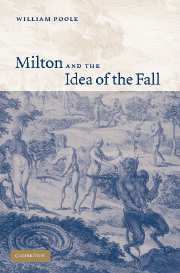Book contents
- Frontmatter
- Contents
- Acknowledgements
- Note on the text
- List of abbreviations
- Introduction
- Part I Fallen culture
- Part II Milton
- 7 Towards Paradise Lost
- 8 Paradise Losti: the causality of primal wickedness
- 9 Paradise Lostii: God, Eden and man
- 10 Paradise Lostiii: creation and education
- 11 Paradise Lostiv: Fall and expulsion
- Conclusion
- Notes
- Index
10 - Paradise Lostiii: creation and education
Published online by Cambridge University Press: 10 December 2009
- Frontmatter
- Contents
- Acknowledgements
- Note on the text
- List of abbreviations
- Introduction
- Part I Fallen culture
- Part II Milton
- 7 Towards Paradise Lost
- 8 Paradise Losti: the causality of primal wickedness
- 9 Paradise Lostii: God, Eden and man
- 10 Paradise Lostiii: creation and education
- 11 Paradise Lostiv: Fall and expulsion
- Conclusion
- Notes
- Index
Summary
Adam and Eve, we have discussed, resemble to an extent the tall philosophers of the conventional Augustinian account. Problems arose, however, when we tried to get close to Eden and its occupants, as a state of knowing turned into a state of merely weening. A further complication is produced by Milton's organisation of Paradise Lost as temporally non-linear: we start in hell, fallen, and only later get back to earlier.
This problem is replicated by Adam and Eve themselves, because they narrate the story of their own origin – we do not actually see the moments of their separate creations first-hand. When we first hear them speak they are already five days old, and even by that point they possess slightly different linguistic personalities. Adam's opening speech (4.411–39) is static: he talks of praise, ease and prohibition. Absent is any sense of time, of things past and to come. Eve, in contrast, is quickly aware of change, development and history. She recalls her first moments of ‘unexperienc't thought’ (457), and she continues by recounting her creation and her actions immediately subsequent.
Eve's creation, as she recalls it, is a uniquely childish affair, and it is at this point more than at any other in Paradise Lost that Milton follows the Greek patristic tradition, represented by Irenaeus: ‘man was a child, not yet having his understanding perfected’.
- Type
- Chapter
- Information
- Milton and the Idea of the Fall , pp. 168 - 181Publisher: Cambridge University PressPrint publication year: 2005

